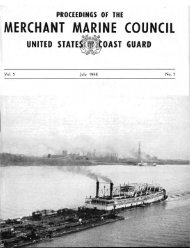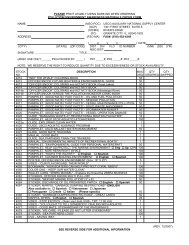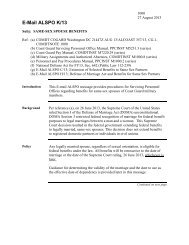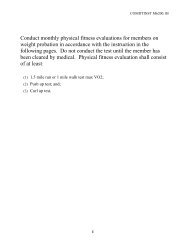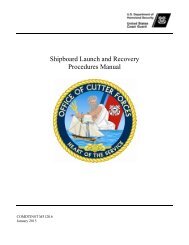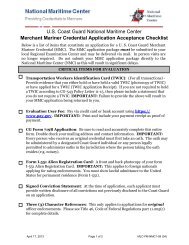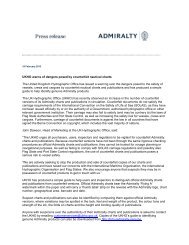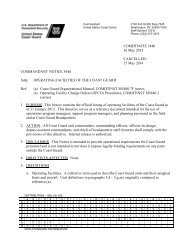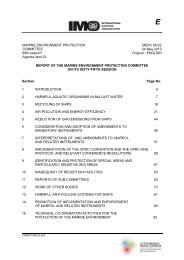Immunotherapy Safety for the Primary Care ... - U.S. Coast Guard
Immunotherapy Safety for the Primary Care ... - U.S. Coast Guard
Immunotherapy Safety for the Primary Care ... - U.S. Coast Guard
You also want an ePaper? Increase the reach of your titles
YUMPU automatically turns print PDFs into web optimized ePapers that Google loves.
Allergy immuno<strong>the</strong>rapy administration by licensed nursing staff<br />
By Arline M. Gerard, RN, Kaiser Orange County, CA<br />
It is within <strong>the</strong> scope of practice of licensed nurses to administer allergy immuno<strong>the</strong>rapy medications <strong>for</strong><br />
<strong>the</strong> purpose of treatment of allergy patients.<br />
Authority <strong>for</strong> nurses to administer medications derives from varying sections of <strong>the</strong>ir states’ Nurse<br />
Practice Act (NPA). Most states place few limits on <strong>the</strong> type of medication or route of administration;<br />
<strong>the</strong>re is often only a requirement that <strong>the</strong> drug be ordered by one lawfully authorized to prescribe it. O<strong>the</strong>r<br />
relevant sections of some NPA’s do impose additional requirements, but <strong>the</strong>se generally do not pertain to<br />
allergy immuno<strong>the</strong>rapy extract vaccines. Specifically, <strong>the</strong> nurse should be competent to per<strong>for</strong>m <strong>the</strong><br />
function of administering medications, and this task must be per<strong>for</strong>med in a manner consistent with <strong>the</strong><br />
standard of practice expected of a diligent nurse, in that state.<br />
In administering medication/extracts <strong>for</strong> treatment of allergy patients, <strong>the</strong> nurse is required to have <strong>the</strong><br />
same knowledge and skills as <strong>for</strong> any o<strong>the</strong>r medication that she/he administers. This knowledge base<br />
includes, but is not limited to:<br />
• Effects of <strong>the</strong> medication/extract<br />
• Potential side effects of <strong>the</strong> medication/extract<br />
• Contraindications <strong>for</strong> <strong>the</strong> administration of <strong>the</strong> medication/extract<br />
• Amount of <strong>the</strong> medication/extract to be administered<br />
• Dilution of <strong>the</strong> medication/extract to be administered<br />
The requisite skills include <strong>the</strong> ability to competently and safely administer <strong>the</strong> medication/extract by <strong>the</strong><br />
specified route, anticipate and recognize potential complications of <strong>the</strong> medication/extract, recognize<br />
emergency situations, and institute emergency procedures. Thus, <strong>the</strong> nurse would be held accountable <strong>for</strong><br />
knowledge of <strong>the</strong> medication/extract and <strong>for</strong> ensuring that <strong>the</strong> proper safety measures are followed.<br />
As of March 2003, safety considerations <strong>for</strong> allergy immuno<strong>the</strong>rapy administration include <strong>the</strong> standards<br />
embodied in <strong>the</strong> Practice Parameters. These national standards were issued jointly by <strong>the</strong> American<br />
Academy of Allergy, Asthma & Immunology with <strong>the</strong> American College of Allergy, Asthma &<br />
Immunology. The Practice Parameters should be consulted in establishing and maintaining allergy office<br />
policies and procedures.<br />
The nurse administering allergy immuno<strong>the</strong>rapy should conduct a brief nursing assessment to determine<br />
that administration of <strong>the</strong> medication/extract is in <strong>the</strong> patient's best interest, <strong>for</strong> that visit. The nurse would<br />
also ensure that all safety measures are en<strong>for</strong>ced, including back-up personnel skilled and trained in<br />
airway management, resuscitation and emergency intubation, should complications occur. Nurses<br />
managing <strong>the</strong> care of patients receiving allergy immuno<strong>the</strong>rapy shall expect <strong>the</strong> patient to wait, post<br />
injection. The nurse should not engage in tasks that would seriously compromise monitoring of <strong>the</strong><br />
patient by <strong>the</strong> nurse. The nurse must have knowledge of signs and symptoms of a reaction to <strong>the</strong><br />
medication/extract, and must be empowered to give epinephrine and o<strong>the</strong>r treatments, immediately, when<br />
determined to be necessary.<br />
A nurse is held accountable <strong>for</strong> any act of nursing provided to a patient. The nurse has <strong>the</strong> right and<br />
obligation to act as <strong>the</strong> patient's advocate by refusing to administer or continue to administer any<br />
medication/extract not in <strong>the</strong> patient's best interest; this includes medication/extracts which may cause <strong>the</strong><br />
patient to have an anaphylactic event, especially when given in error. Basic immuno<strong>the</strong>rapy <strong>for</strong>ms



